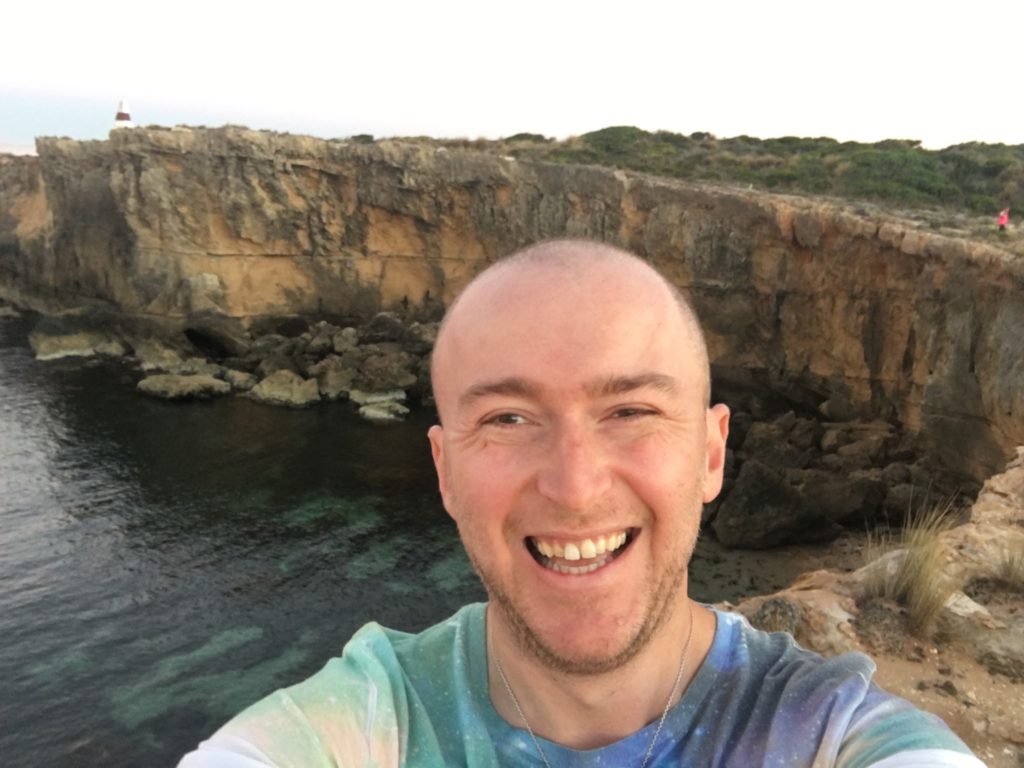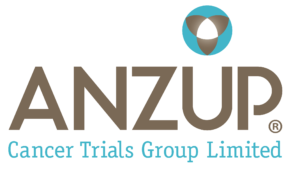THE JOURNEY – JOE’S QUEST TO SIMPLIFY CANCER
Joe Bakhmoutski never thought he would have to deal with cancer. Cancer was something that happened to others. When Joe found out that he had testicular cancer, everything was suddenly up in the air. Life seemed so much harder.
Treated for testicular cancer by medical oncologist Dr David Pook, it has been a trying time for Joe and his family. By working through the many trials and tribulations that come with cancer, Joe has discovered a new sense of purpose, passion and potential.
‘Losing my testicle, chemo and procedures hammers home what I always knew, but was never forced to confront in a real, tangible way – how fragile and short life is and how I need to make the most of it, on my terms.’
He has immersed himself in knowledge about treatment and side effects and it became a powerful weapon against worry and uncertainty.
Joe has now written a book called, ‘Finding Hope in Times of Uncertainty: A Guide to Thriving in the Challenging World of Today’. He shares practical ways to tackle uncertainty in your daily life and help you bounce back after a crisis. Joe is a proud and passionate supporter of ANZUP and he is donating $5 dollars of each copy of his latest book sold to support ANZUP clinical trials.
Find out more and purchase Joe’s book.
Joe believes that we must connect treatment to cutting edge research in order to free patients from the clutches of cancer.
Through his Simplify Cancer podcast, Joe brings together expert advice and survivor insights to help tackle cancer mentally, socially and emotionally.

Q: What events led up to your diagnosis, or, how did you discover what you were suffering from was cancer?
A: It has been wrong from the start, like ants in my pants – my undies always too tight; I could never get to sleep properly, hot flushes… Then, one night in the shower I felt my testicles and a shudder went through me when I found the lump. It was cold, hard, foreign, and I knew it was serious. From then on, it all happened quite quickly!
Q: What was your first reaction when you were told you had cancer?
A: I went completely numb. The whole world froze around me, I couldn’t think, it just didn’t add up… Nothing made sense anymore. It’s weird; you think that cancer always happens to somebody else, until it’s your “lucky” turn!
Q: Obviously, cancer puts your whole life on hold. Do you remember a specific moment when you were hit by this realisation?
A: Imagine you’re in the bush. It’s a beautiful day, you’re having a great time, enjoying the scenery and you’re looking forward to nice long walk. Suddenly, somebody puts a blindfold on you. You can’t see, you’re lost, stumbling, in the dark where nothing is for certain. This constant uncertainty is what it hit me the most, when I was in my oncologist’s waiting room, that I can’t make plans. Everything is up in the air and you are forced to live day to day.
Q: What did you do to help meet the challenges of your treatments?
A: Learning the ins and outs of chemotherapy, of side effects and what things I need to pay attention to, and that not only gave me confidence in understanding what’s going on, but also whoever I spoke to, there was no need to dumb it down for me, it was incredibly crucial for me to have boundaries around cancer and all the worries around it.
Q: How long were you in treatment? What helped keep your spirits up and gave you support during this period?
A: Apart from procedure to remove my testicle, I went through 9 weeks of BEP chemotherapy. Now if the ANZUP accelerated BEP trial had its way, it could be 6 weeks! But what helped me most was slowing everything down.
We live in such a rush that only when something like cancer comes around, do we take the time to stop and soak in the life around you, to stop multitasking and be fully in the moment, in the now, without thinking or, or wandering what’s next, or what you need to get done… When I started to play with my son, I could get completely lost in that, just have tons of fun because you don’t know how much time you’ve got.
Even if there’s no cancer, this time in your life, the now, it’s going to be gone and you never get it back. So I promised myself that I will never take things for granted, that I will never look back on my life and think – where did it all go? Did I leave a mark? Was I fully there with people I truly care about? This made me look at things in an entirely new way, like this shining light pulling me forward!
Q: Where did your idea to create Simply Cancer come from?
A: Despite the support I had, there were times when I felt scared and alone. And having spoken to many cancer patients and survivors, I know that feeling is universal! So I created a podcast I would’ve wanted to listen to when I was waiting for my test results, or plugged in for my chemo, one that my mum would hear with not even the words of encouragement, but just knowing that there’s a life beyond this!
Q: How did you get started?
A: It’s incredibly selfish of me, to be honest! I needed to find something that was bigger than me, a bigger cause that I could put my energy into, away from worries about cancer coming back
Q: Did it change along the journey?
A: I want to reach more people through the podcast, through the website, through speaking, to say that you can take the power back from cancer, to find ways to put it in its place in a very positive, powerful way. My belief in this has only strengthened, to be honest, because of the feedback I have received, that people need to hear, this means so much to me.
Q: Where did you get your ideas for your podcasts?
A: I’m fascinated by stories and whenever I come across something interesting, whether that’s an article, a post, a book, or a speech, or, ideally, a conversation, I want to know more so hearing those stories is what I love! Stories are what make us all come alive, come together and help each other.
Q: You have created all different types of episodes for your podcasts, with different speakers / themes, why is that?
A: We end up with cancer completely unprepared, just lost, so it’s crucial to reorientate yourself in this new reality… And I believe the way to do that is to get different perspectives on cancer, to hear from people who went down that before and how they were dealing with it, as well as experts who have their own unique perspective, and you want to understand their world to find the answers you’re looking for.
Q: Who should listen to your podcasts?
A: Every person whose life has been touched by cancer – if you are dealing with cancer, or building life after cancer, or you have someone you can’t be without… Crucially, if you work with cancer patients and want to get insider’s view of their world, you need to tune in!
Q: How do you envisage Simplify Cancer will evolve?
A: Of course, doing more podcast episodes and getting it to as many people as possible is my aim, but also, Simplify Cancer is going to be a book! Initially, I started writing about my experiences with cancer and what helped me to deal with it, but now, after speaking with so many people, I can see that many of those challenges are universal, and while we have a fantastic medical system, so many issues around dealing with cancer mentally, socially, and emotionally, often these issues just fall by the wayside and we need to find better solutions to deal with that.
Q: What three things would you tell a person who only just learned of their cancer diagnosis?
A: Oh boy, where do I start! Number one, I’d say is having trust in your specialist. It needs to be the person you can confide, who’s positive, who is in control. This person is your guide through what is possibly the toughest time in your life! I was incredibly lucky to have Dr Pook look after me who gave me the confidence that every problem would be taken care of. If you’re not happy with the person looking after you, for whatever reason, find someone else immediately, through your GP! Don’t delay, do it immediately, it’s that important!
Number two is becoming expert on your cancer. Ask your specialist as many questions as you need, because you need to know exactly what’s going on, ask your nurse if you are in a hospital, go to significant, reputable websites like ANZUP Cancer Trials Group and Cancer Council, find an online community that deals with your cancer, do whatever you can to immerse yourself in likely outcomes and treatment. When you do your own research, you can ask more informed questions that can really help you feel more in control.
Third, and this is something I wish I did, is tell your friends, your family, your colleagues, tell them how they can help you because I found is that you expect people to know what you want, but it’s not always easy. They don’t want to say or do the wrong thing, but they want to help, but they don’t know how, and they need you to guide them. Send them an email that spells out what you want.
About Simplify Cancer
The aim of the Simplify Cancer podcasts is to increase mental strength and resilience in an individual’s battle with cancer.
It’s hard to make sense of it all in your everyday life because it’s always there, at the back of your mind.
Each podcast is designed to equip you with information to support you in your journey. Guests have ranged from cancer fighters and survivors to medical experts. They know what cancer is like firsthand.
To find out more go to http://simplifycancer.com/
